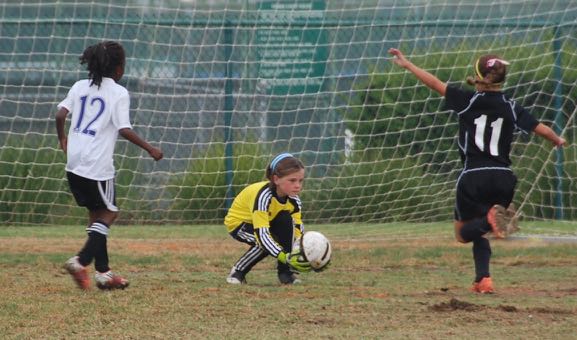I remember when my daughter made her first club soccer team. It was an exciting time and a definite upgrade. Well, certainly an upgrade from her previous coach (yours truly). Now instead of me, she’d have a pro haranguing her about the importance of juggling.
Then came the “merch.” Congrats, you’ve made a club team! That entitles you to buy two jerseys (home and away), socks, a jacket, warm-up pants and a practice shirt.
But wait, there’s more! (Do I sound like an infomercial yet?)

You get a backpack too! It seemed like an endless stream of stuff — and an endless stream of money flowing from our pockets.
It’s good for you to be wary of the cascading consumption of the Diderot Effect in many areas of your kids’ (and even your own) lives.
I didn’t realize it at the time, but this was the Diderot Effect in action. I first encountered French philosopher Denis Diderot in James Clear’s excellent book, Atomic Habits. Clear explains in this blog post that the Diderot Effect is what happens when you make an upgrade in one area that leads to a cascade of costs you hadn’t considered.
Clear’s example in his book (and the instances he mentions in the blog post which I’ve linked above) is instructive. When you buy a new couch, suddenly your other furniture just isn’t suitable, and, before you know it, the $500 couch has cost you a $2500 living room upgrade.
Diderot himself described his effect as having two parts. The upgrading is a consequence of your identification with the new stuff, which then leads you to make changes consistent with your perceived new identity. Framed in terms of needs and wants, my daughter didn’t need a practice shirt. My club soccer-playing daughter did (well, if she wanted to stay on the team).
In case you’re thinking that we were forced to buy these items the club required, I forgot to mention the new cleats and goalie gloves. To be sure, Diderot was wielding his effect.
These cascades of consumption can even be perverse. For example, overeating often leads to the purchasing of diet products:
“Obesity is a double victory for consumerism. Instead of eating little, which will lead to economic contraction, people eat too much and then buy diet products – contributing to economic growth twice over.”
Sapiens by Yuval Noah Harari, page 348
It’s good for you to be wary of the cascading consumption of the Diderot Effect in many areas of your kids’ (and even your own) lives. For example, if you’ve ever acquired a pet for your child, then you certainly know that the cost or adoption of the pet is simply a gateway expense to a spending explosion. Does Scruffy really need dog boots?
Ashley LeBaron and I discuss the importance of money practice — a strength of an allowance program — on The Art of Allowance Podcast and the mistakes that are likely to happen (and from which children learn). Because the Diderot Effect is really about opportunity costs, though, and unforeseen ones at that, it may be worth a discussion with your kids before you see them make mistakes that may lead them down a rabbit hole or two.
Of course, what makes an allowance an effective tool is that kids get to make mistakes in a low-stakes environment. You may have to wait for the Diderot Effect to rear its ugly head before you get the chance to explain its insidious effects. In that case, just know that it’s better that children learn this lesson sooner rather than later (and with less money on the line).
Clear’s post provides some effective tips to helps us avoid the Diderot Effect. I’ve included some more to consider for your kids:
Reduce social media
Set time parameters for your older kids’ use of Instagram. You can use Screen Time to do this on the iPhone. Facebook (and Instagram) is a free platform paid for with our privacy and ad exposure. Micro influencers — folks shamelessly promoting stuff for which they are paid — are particularly problematic for kids. Though they are legally required to disclose their actions, there’s a reason they’re paid — they influence kids to buy.
Share your mistakes
Talk to your kids about how the tide of the Diderot Effect has pulled you in. The importance of parental involvement in raising money-smart kids cannot be overstated (something Ashley LeBaron discussed extensively in our conversation). Having these discussions is part of the financial socialization that we know is correlated with kids who grow up to be money-smart. As Bill Dwight of FamZoo told me on the podcast, even when you think they’re not, your kids are paying attention, and you need to keep the messages flowing.
Promote Frugality
My wife, the OG of The Money Mammals, introduced my kids to shopping for bargains at Goodwill and in flea markets. They still purchase more clothes than I’d like them to (though I’m admittedly a bit extreme), but these strategies, coupled with my wife’s newest get-together, the teen clothes swap, are terrific ways to promote frugal thinking. You can learn more about swaps on Shareable.
The KonMari Method
Yes, Marie Kondo — now of Netflix fame — can help you avoid the Diderot Effect by assisting you in reducing stuff. And the fact that she’s now a pop star might make her ideas more palatable to your kids. Quick aside — I’ve watched a couple of episodes of the show, but it’s her book that I found really useful.
My daughter has moved on from club soccer, and we’ve donated or swapped all her old gear. Writing this article reminded me to have another conversation with both her and her older sister about being wary of the dreaded Diderot Effect. I hope it helps you to do the same with your kids.
